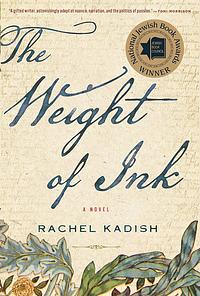Take a photo of a barcode or cover
In many ways, this book reminds me of Possession, though without the romance part. Which in some ways is refreshing. I think it went a little too pat at the ending, but that is personal taste.
This book was a well-researched, perhaps too academically oriented but ultimately moving story about 17th century Jewish London. Encompassing weighty topics like philosophy, the role of women in 17th c Jewish culture (basically the same as the role of women in non-Jewish 17th c culture--shitty), the quietly cutthroat world of academia, Plague, Spinoza: all a bit too heady for me at times. As always, the little lives of human minds and hearts are the most compelling.
I had a hard time getting through this story. I was unable to connect with any of the characters and sometimes had a hard time following the story. I'll admit I listened to the book and was occasionally distracted which, I'm sure, made it more difficult to follow. The story is intricate and written on a higher level of difficulty than I usually choose. It was not a quick read. However, the story was well written if you want a book that has an intricate plot. If you are able to really sit down and read a story written on a higher level this would be a good book. I liked the book better the closer I got to the ending. The plot seemed to unravel a bit faster at that point. I also thought the book did a good job showing some character development. I think some of my disappointment in the book came from my lack of history knowledge of the time period. I was unfamiliar with the history of the period, which made some of the information hard to follow. Also there were a lot of supporting characters, and I had a hard time keeping them all straight. I recommend this book for ages 16 and up due to some mature content.
The story was very long and hard to get through. I did make it to the end, but I found myself dreading reading each time I picked the book up. I recommend this for 16 and up.
The novel pivots from the 17th to the 21st century in alternating chapters. Professor Helen Watt studies Jewish history. On the verge of forced retirement and ill with advanced Parkinson's disease, she uncovers some exceptional manuscripts from the 1600s. Aided by Aaron Levy, an American graduate student, she sets out to uncover the story behind them. The alternating chapters deal with the author of the documents, Ester Velasquez, who has emigrated to London from Amsterdam and serves as scribe for a blinded rabbi.
Aside from being the story of two remarkable women, Helen and Ester, the novel provides a wonderful glimpse into the difficulties of being an historian. Helen and Aaron see bits of Ester's life and have to deduce much more as best they can. The Ester chapters introduce us to the richness of her past, presenting details that are simply not available to the historians. As an historian myself, I found this to be fascinating. Included too is a competition with another historian to tell the story first.
And there is yet another level to the story, Ester's quest as a woman to be heard in a society where the role of women is restricted. It's a quest that that Helen has grappled with too.
And, finally, there is a philosophical dimension to the Ester story, for she is grappling with the meaning of God.
All in all, this is an exceptional book.
Aside from being the story of two remarkable women, Helen and Ester, the novel provides a wonderful glimpse into the difficulties of being an historian. Helen and Aaron see bits of Ester's life and have to deduce much more as best they can. The Ester chapters introduce us to the richness of her past, presenting details that are simply not available to the historians. As an historian myself, I found this to be fascinating. Included too is a competition with another historian to tell the story first.
And there is yet another level to the story, Ester's quest as a woman to be heard in a society where the role of women is restricted. It's a quest that that Helen has grappled with too.
And, finally, there is a philosophical dimension to the Ester story, for she is grappling with the meaning of God.
All in all, this is an exceptional book.
I found the first half a little slow and enjoyed the second half a lot more. I am glad I stuck with this one because in the end I really enjoyed it. I liked how the characters changed and grew along the way. A slow, enjoyable experience.
I knew nothing about the shabathite and the supposed messiah of the 17th century who subsequently converted to Islam. It was informative that the Pilgrims were removed from English government and the horrors of the plague (and comet portent) that decimated so much of London, but the influx of Jewish residents who had been totally banished during the period. I think it was very imaginative to think that Shakespeare could have been involved with a Jewess during the time also. The information about the controversy with Spinoza philosophy and the God or Nature thought reminds me of "Is that all there is?" by Peggy Lee.
This is a ponderous novel but somehow I think the writing is meant to be reflective of the times and context it portrays. The writing is in character. And the characters pull you in - eventually. I almost didn’t finish it but glad I did. I wanted to give it 3.5 stars or 4.5 - I’m ambivalent. See what you think.
reflective
slow-paced
Plot or Character Driven:
Character
Strong character development:
Yes
Loveable characters:
Complicated
Diverse cast of characters:
Yes
Flaws of characters a main focus:
Complicated

